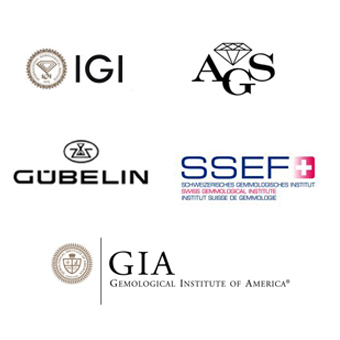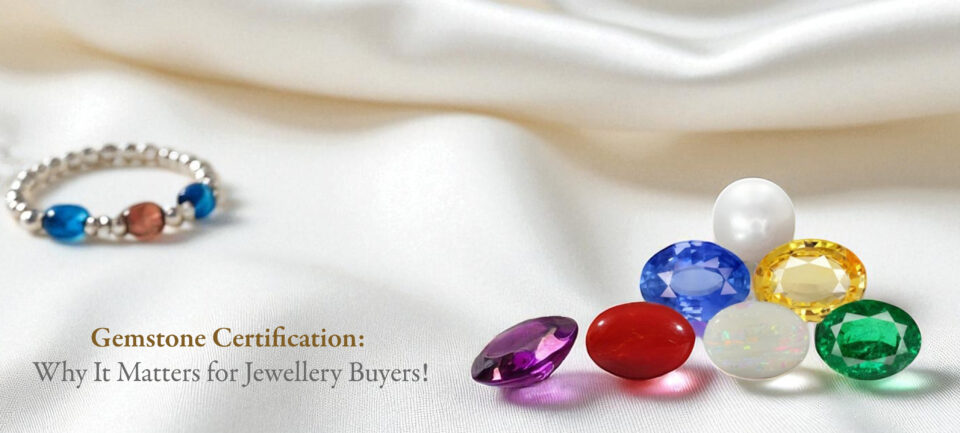When you fall in love with a piece of jewellery-an engagement ring made of a blue sapphire, a pair of emerald earrings, or a healing crystals pendant–you do not purchase it only for beauty. You are spending on a meaning, legacy and trust. But what can you be sure about that the gemstone that you are holding is what it claims to be?
This is where gemstone certification is necessary. To jewelry consumers, and particularly those interested in authenticity, ethically sourced, and value-added purchases, certification is not merely a technicality: it is required.
What Is Gemstone Certification?
Gemstone certification is a certificate that is provided by a gemological lab to ensure the identity, quality and nature of a gemstone. You can consider it the birth certificate and resume of the gemstone mixed together.
An average certificate contains:
- Gemstone type (such as ruby, aquamarine, tourmaline)
- Carat weight
- Cut and Shape
- Color grade
- Clarity grade
- Treatments like Heat, irradiation, dyeing (e.g.)
- Origin (where determinable)
Advanced testing also covers such parameters as spectroscopy, refractive index, and fluorescence.
More to know – Best Gemstones For Your Solitaire Ring
Who Issues These Certificates?
All certificates are not the same. Some of the Well-known gemological laboratories are:
GIA (Gemological Institute of America) – Gold standard for diamonds and colored stones
AGS (American Gem Society) – has a reputation for imposing strict standards of grading
IGI (International Gemological Institute) – Popular for commercial jewels
Gubelin and SSEF – Trusted for the reports of high-value colored stones, origin
These labs employ high-tech facilities and objective guidelines to be accurate. Be cautious of in-house or seller-issued certificates—they may lack objectivity or scientific rigour.

Why Certification Matters for Buyers?
1. Authenticity and Peace of Mind
With the wave of synthetics, knock-offs and dyed stones, certification is your armour. It authenticates that your gemstone is natural (in case it is so), and it reveals whether the gemstone has undergone any enhancement. Consider an example, a natural untreated one would fetch a lot more than a heat-treated ruby – certification can distinguish the difference.
2. Fair Pricing
Without certification, you trust only the word of the seller. A certified gem has a fixed set of verified specifications, so you might compare the prices between the retailers and make sure you are not overpaying. It is the decision between a car that shows a verifiable VIN and a car with a handwritten note.
3. Insurance value and Resale
Are you going to insure your jewellery, or bequeath it to an heirloom? Certification offers the necessary documentation to the insurers and appraisers. It also increases resale value- buyers will be much more willing to trust a certified gem.
4. Ethical and Origin Transparency
To conscious customers, the place of origin is important. In some labs, the geographic origin of a gemstone can be determined, which enables buyers to make sure that no conflict landscape or unethical mining process is used. A certified Colombian emerald or a Sri Lankan sapphire not only represents prestige, but also the lack of worries.
5. Emotional Integrity
The most notable moments of life are usually punctuated by jewelry, engagements, anniversaries and personal changes. Certification guarantees that the history of your gem is authentic, just as the emotions it represents. It involves truth in the symbolism.
Common Misconceptions
- Only diamonds are certified. Not true. Coloured gemstones and even crystals can be certified in color.
- It costs too much. A lot of them do not cost more than 100 dollars, which is well worth it for the peace of mind.
- I depend on my jeweler. It is good to trust; however, it is best to check. Honest sellers, too, may err.
Before you buy, what to ask?
Prior to buying a gemstone, inquire:
- Does this stone have a 3rd party lab certification?
- Is the certificate available beforehand to see?
- Has the stone received any forms of treatment?
- May I have a lab report number that is accessible online?
When the seller is hesitant or deflects, it is a red flag.
Also Read – Is It Safe to Purchase Gemstones Online? – A Buyer’s Checklist
Verification of a Certificate
Virtually all gemological labs provide web-based verification services. To verify its validity, you could type the certificate number on their site. This particularly comes in handy when one wants to sell, insure or gift the gem.
Conclusion
We live in a world where beauty can be created and narratives can be fabricated, so gemstone certification is your point of reference to reality. Not science only but trust and transparency and respecting the emotional value of what you wear.
Buy to love, heal, make legacy: as you shop, make sure your gemstone also comes with a story you can verify, that is not just told.
Visit our website Navratan now to get the best gemstone, all natural and certified. You can also get your gemstone certified with us. Choose from our exclusive collection, or if you need proper consultation, our experts are here to help.

